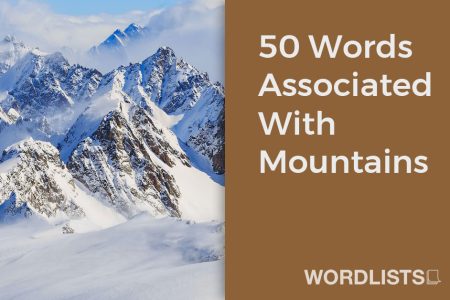Mountains are natural wonders that inspire awe and wonder in people. Whether you’re an avid hiker or simply enjoy the beauty of these massive formations, there are many words associated with mountains that help us describe and understand them.
From technical terms for the different types of mountains to words that describe the experiences and feelings that mountains evoke, this list of 50 words will give you a greater appreciation for these towering landscapes.

Subscribe to our mailing list to receive FREE exclusive content and offers!
50 Words Associated With Mountains Meanings
Peak: The pointed top of a mountain or ridge, often covered in snow.
Summit: The highest point or part of a mountain, typically pointed or rounded.
Ridge: A long, narrow elevated land formation with sloping sides, often connecting two or more peaks of a mountain.
Valley: A low area between hills or mountains, often with a river running through it.
Slope: The side of a mountain, hill, or valley, usually inclined or slanted.
Cliff: A steep, high rock face, especially at the edge of the sea or along the sides of mountains.
Boulder: A large rock, typically one that has been weathered or rounded by erosion.
Rock: Solid mineral material forming part of the surface of the earth and other planets, visible on mountains.
Stone: A small piece of rock found on the ground or mountain.
Ice: Frozen water, a common sight at high elevations or in cold mountain environments.
Snow: Atmospheric water vapor frozen into ice crystals, commonly seen on mountains.
Glacier: A slowly moving mass or river of ice formed by the accumulation and compaction of snow on mountains.
Avalanche: A rapid flow of snow down a hill or mountainside.
Terrain: The physical features of a tract of land including its natural and man-made elements.
Landscape: All the visible features of an area of countryside or land, often in terms of their aesthetic appeal.
View: A sight or prospect, typically of attractive natural scenery, from a particular location.
Horizon: The line at which the earth’s surface and the sky appear to meet, often visible from high altitudes on a mountain.
Elevation: The height above a given level, especially sea level.
Altitude: The height of an object or point in relation to sea level or ground level.
Topography: The arrangement of the physical features of an area, such as mountains.
Geology: The study of solid features of any celestial body (including Earth), including mountains.
Sediment: Matter that settles to the bottom of a liquid; on mountains, this can be seen as silt or gravel.
Erosion: The process of eroding or being eroded by wind, water, or other natural agents, often impacting mountain formations.
Weathering: The wear away of rocks and soil due to the action of weather, water, or other biological activity.
Vegetation: Plants considered collectively, especially those found in a particular area or habitat, such as a mountain.
Forest: A large area covered chiefly with trees and undergrowth, often found on mountains.
Trees: A woody perennial plant, typically having a single stem or trunk, which are often found on mountains.
Snowboarding: The activity or sport of descending snow-covered slopes on a snowboard, often done on mountains.
Snowshoeing: The activity or sport of walking over snow with the assistance of snowshoes, often done on mountains.
Shrubs: A woody plant which is smaller than a tree and has several main stems arising at or near the ground.
Grass: Herbaceous plants with narrow leaves growing from the base, often covering the lower slopes of mountains.
Flowers: The seed-bearing part of a plant, often adding color to mountain landscapes.
Animals: Any member of the kingdom Animalia, many of which live in mountainous regions.
Birds: A group of warm-blooded vertebrates constituting the class Aves, identifiable by their feathers, toothless beaked jaws, and typically by their ability to fly.
Insects: A class of invertebrates within the arthropod phylum that have a chitinous exoskeleton, a three-part body, three pairs of jointed legs, compound eyes, and one pair of antennae.
Reptiles: Cold-blooded vertebrates constituting the class Reptilia, including turtles, snakes, lizards, and crocodiles.
Amphibians: Cold-blooded vertebrates constituting the class Amphibia, including frogs, salamanders, and caecilians.
Mammals: Warm-blooded vertebrate animals constituting the class Mammalia, including humans, characterized by the possession of hair, the secretion of milk by females for the nourishment of the young, and (typically) the birth of live young.
Predators: An animal that naturally preys on others for food, often found in mountainous ecosystems.
Prey: An animal that is hunted and killed by another for food.
Herbivores: An animal that gets its energy from eating plants, and only plants.
Carnivores: An animal that feeds on other animals.
Omnivores: An animal or person that eats a variety of food of both plant and animal origin.
Ecology: The branch of biology that deals with the relations of organisms to one another and to their physical surroundings.
Environment: The surroundings or conditions in which a person, animal, or plant lives or operates, such as a mountain environment.
Biodiversity: The variety of life in the world or in a particular habitat or ecosystem.
Conservation: The preservation or efficient use of resources (in this context, natural resources), in an effort to prevent depletion.
Hiking: The activity of going long walks, especially across country, typically in mountains.
Climbing: The sport or activity of ascending mountains or cliffs.
Skiing: The action of traveling over snow on skis, especially as a sport or recreation. Often done on mountains.







